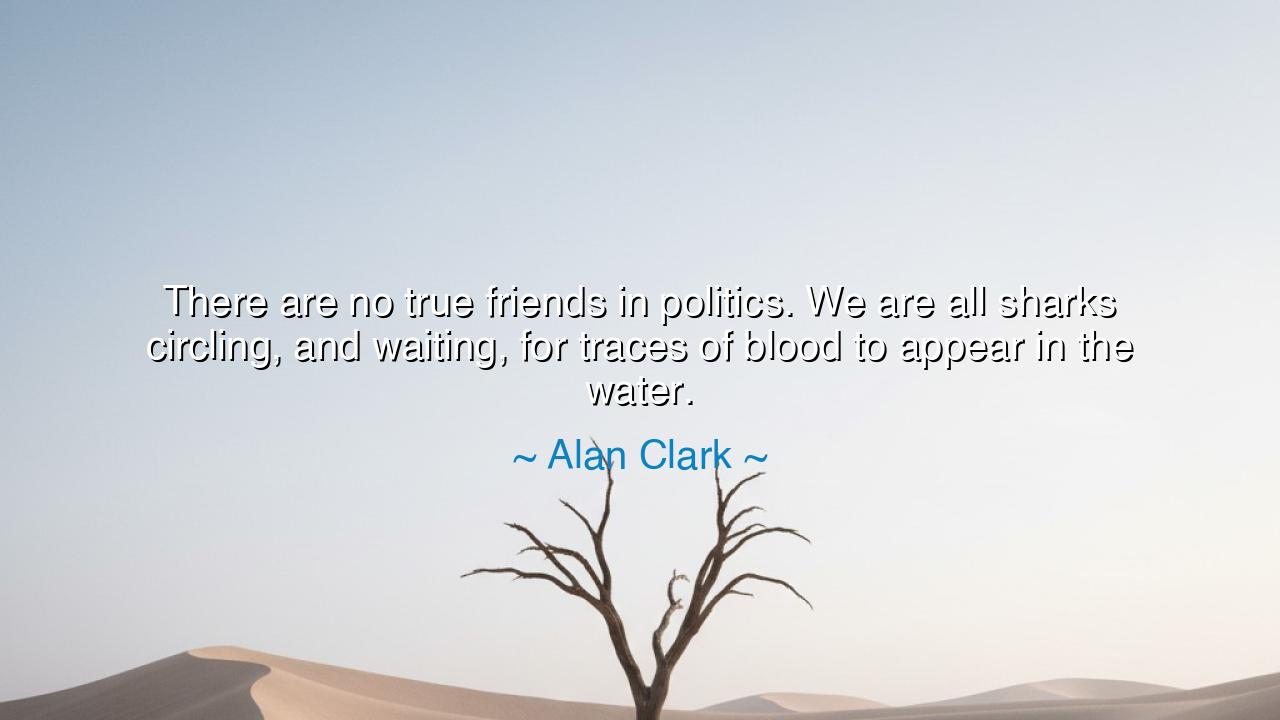
There are no true friends in politics. We are all sharks
There are no true friends in politics. We are all sharks circling, and waiting, for traces of blood to appear in the water.






Hear, O children of the ages, the bitter but piercing words of Alan Clark: “There are no true friends in politics. We are all sharks circling, and waiting, for traces of blood to appear in the water.” These words, harsh as the sea winds, unveil the hidden nature of power. In the realm of politics, alliances are fragile, loyalty is fleeting, and beneath every smile lies calculation. The banquet of comradeship is often but a mask for hunger, and each guest waits for the moment when weakness can be devoured.
For friendship is born of trust, yet in politics, trust is often the most fragile coin. There, ambition outweighs affection, and rivalry sleeps lightly, ever ready to awaken. Clark’s metaphor of sharks circling reminds us that in the waters of power, the scent of vulnerability draws not comfort but attack. A stumble, a misstep, a single drop of blood—and the circle closes swiftly, tearing down those who falter.
History bears many such tales. Recall the fate of Julius Caesar, who returned from conquest crowned with glory, yet found himself surrounded by supposed allies. Senators who once called him friend plunged daggers into his flesh upon the Ides of March. They circled him with smiles until the blood appeared, and then the feeding frenzy began. In this we see Clark’s truth: that politics, though clothed in fine words, can turn friend into predator.
Nor was Rome alone in this. In the courts of medieval Europe, kings and queens fell as swiftly as they rose, betrayed by counselors who professed loyalty by day but plotted treachery by night. Even in modern times, leaders topple not always by the will of the people, but by the hands of colleagues who sense weakness and strike swiftly to seize the mantle of power. Politics, in every age, is a sea where predators swim, cloaked in civility.
Therefore, O seekers of wisdom, take heed. Enter the waters of politics with open eyes, knowing that smiles may conceal teeth. Yet despair not—for though the sea is perilous, it is also where the bold carve destinies. The wise must learn to guard themselves, to see beyond masks, and to wield power with vigilance. Clark’s words are not only a warning but a lesson: in the ocean of ambition, survival belongs not to the trusting, but to the discerning.






QMTRAN QUAN MINH
Alan Clark’s statement suggests that politics is a world of constant competition, where alliances are temporary and self-interest rules. But could this also reflect the nature of power itself? Is it possible that, rather than a lack of friendship, politics is simply a realm where relationships are constantly tested and reshaped? Is it really so difficult to find genuine camaraderie, or do we expect too much from an environment driven by ambition and strategy?
TNTieu Ngan
This quote by Alan Clark definitely captures a cynical view of politics. It’s as if politicians are always waiting for someone to fail, to gain an upper hand. But can we view this another way? Could it be that the competitive nature of politics doesn’t necessarily preclude meaningful relationships or progress? Perhaps it’s more about the tension between self-interest and public service, with those who find a balance between the two being the outliers.
THTran Thi Thu Huyen
Clark’s comparison of politicians to sharks circling for blood seems to highlight the ruthlessness often associated with politics. But does this mean that all political relationships are inherently self-serving? Is there room for ethical leadership and collaboration, or does the drive for power always overshadow any sense of genuine friendship or trust? It’s a sobering thought that suggests political systems may inherently breed suspicion and opportunism, rather than cooperation.
LDLe Dang
This quote by Alan Clark feels harsh but realistic. Politics is often portrayed as a game of survival, where every action is calculated for personal or party gain. But is this perspective always accurate? Are there instances in politics where individuals genuinely work together for the common good, or is this constant hunger for weakness truly the nature of political life? It makes me wonder if we are too quick to dismiss any true camaraderie in politics.
KLKhoa Le
Alan Clark's quote paints a grim picture of politics, where true friendship is replaced by opportunism. The comparison to sharks circling in the water suggests a lack of genuine loyalty and an environment where everyone is waiting for a moment of weakness. Is this really the reality of politics, or is it a cynical view? Can true alliances and friendships exist in such a cutthroat environment, or is self-interest the only true driving force?